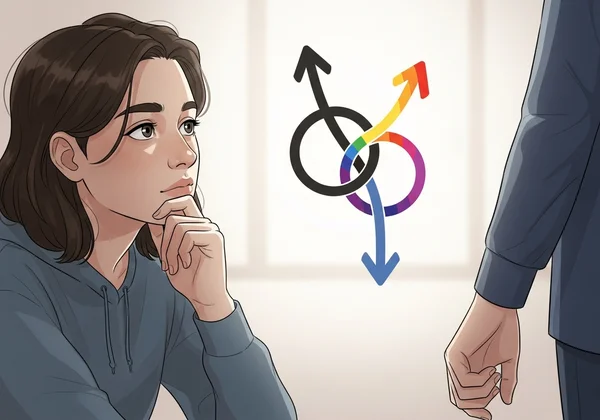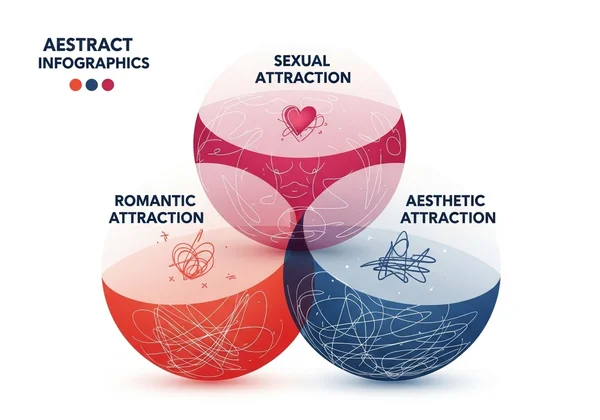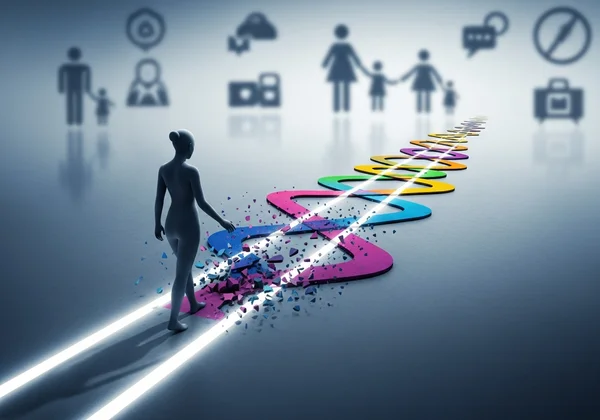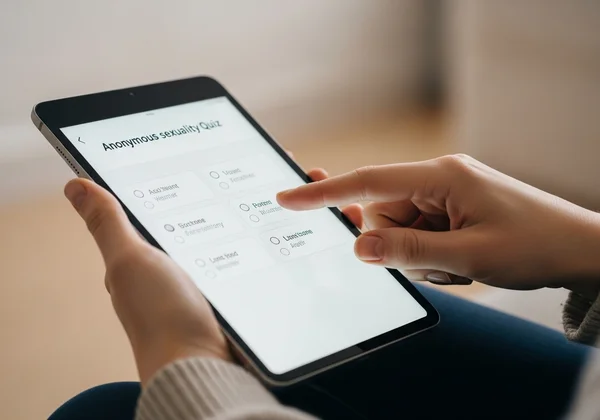Bin ich schwul, wenn ich Mädchen mag, aber einen Freund habe? Mach unser Queer-Quiz, um deine Sexualität zu erkunden
Das Gefühl, sich zu Mädchen hingezogen zu fühlen, während man in einer Beziehung mit einem Freund ist, kann unglaublich verwirrend und isolierend sein. Du fragst dich vielleicht: „Bin ich schwul, wenn ich Mädchen mag, aber einen Freund habe?“ Diese Frage kann eine Flut von Emotionen auslösen, von Schuldgefühlen bis hin zu Neugier. Zuerst atme tief durch. Was du fühlst, ist häufiger, als du denkst, und es ist völlig legitim, diese Gedanken zu erforschen. Dieser Leitfaden ist ein sicherer Raum für dich, um die Komplexität von Anziehung und Identität zu verstehen.
Deine Reise der Selbstfindung ist einzigartig, und das Infragestellen ist ein natürlicher Teil davon. Viele Menschen finden sich in einer ähnlichen Situation wieder und navigieren durch Gefühle, die nicht in einfache Schubladen passen. Ist es normal, meine Sexualität zu hinterfragen? Absolut. Es ist ein Zeichen dafür, dass du mit deiner inneren Welt in Einklang bist und dich selbst tiefer verstehen möchtest. Wenn du bereit bist, diese Gefühle zu entwirren, kannst du deine Reise beginnen mit Ressourcen, die dir helfen, auf private, nicht-wertende Weise zu reflektieren.

Deine Sexualität in einer Beziehung hinterfragen: Deine Gefühle sind berechtigt
Es ist ein weit verbreitetes Missverständnis, dass man seine Sexualität nur in Frage stellen kann, wenn man Single ist. Die Wahrheit ist, dass diese Gefühle jederzeit auftauchen können, selbst wenn man in einer glücklichen und engagierten Beziehung ist. Dein aktueller Beziehungsstatus entwertet weder deine innere Erfahrung noch deine Anziehungen. Das Anerkennen dieser Gefühle ist der erste Schritt, um dein wahres Ich zu verstehen.
Dieser Prozess handelt nicht davon, Fehler bei deinem aktuellen Partner oder deiner Beziehung zu finden; es geht darum, deine eigene Identität zu ehren. Das menschliche Herz ist komplex, und wer wir sind, kann sich entwickeln. Dir selbst die Erlaubnis zu geben, diese Fragen ohne Urteil zu erforschen, ist ein tiefgreifender Akt der Selbstfürsorge und Ehrlichkeit.
Warum hinterfrage ich meine Sexualität gerade jetzt?
Der Zeitpunkt dieser Fragen kann sich oft zufällig anfühlen, aber es gibt in der Regel zugrunde liegende Gründe. Vielleicht hast du einen Film mit einer fesselnden gleichgeschlechtlichen Romanze gesehen, die dich berührt hat, oder du hast eine enge Freundschaft mit einer Frau entwickelt, die andere Arten von Gefühlen ausgelöst hat. Manchmal ist es einfach eine leise, innere Veränderung, während du wächst und mehr über dich selbst lernst.
Diese Auslöser sind kein Zeichen dafür, dass etwas falsch ist. Stattdessen sind sie Einladungen, tiefer zu blicken. Lebenserfahrungen können Teile von uns freisetzen, die wir zuvor nicht in Betracht gezogen hatten. Deine Gefühle sind kein Verrat an deinem Partner; sie sind eine Kommunikation deines inneren Selbst, das gehört und verstanden werden möchte.
Verschiedene Arten von Anziehung verstehen: Romantisch, Sexuell und Ästhetisch
Um deine Gefühle zu verstehen, hilft es zu wissen, dass Anziehung keine einzelne, einfache Sache ist. Es ist eine vielschichtige Erfahrung, die in verschiedene Typen unterteilt werden kann. Das Verständnis dieser Unterschiede kann unglaubliche Klarheit in deine Verwirrung bringen.
- Sexuelle Anziehung: Dies ist ein Verlangen nach sexuellem Kontakt oder Intimität mit einer anderen Person. Es ist die Art von Anziehung, an die die meisten Menschen denken, wenn sie das Wort hören, aber es ist nur ein Teil des Puzzles.
- Romantische Anziehung: Dies beinhaltet den Wunsch nach einer romantischen Beziehung mit jemandem. Es umfasst emotionale Intimität, Partnerschaft und tiefe Verbundenheit. Du kannst dich romantisch zu jemandem hingezogen fühlen, ohne dich sexuell zu ihm hingezogen zu fühlen, und umgekehrt.
- Ästhetische Anziehung: Dies ist eine Wertschätzung für das Aussehen oder die Schönheit einer Person, ähnlich wie man ein Kunstwerk schätzen würde. Sie beinhaltet nicht unbedingt den Wunsch nach einer sexuellen oder romantischen Beziehung.
Es ist möglich, deinen Freund romantisch zu lieben und gleichzeitig eine wachsende sexuelle oder romantische Anziehung zu Frauen zu empfinden. Diese Gefühle können koexistieren, und ihre weitere Erforschung mit einem Sexualitäts-Quiz kann eine strukturierte Möglichkeit bieten, über diese verschiedenen Ebenen der Anziehung nachzudenken.

Zwangsheterosexualität (Comp-Het) und ihre Auswirkungen verstehen
Ein mächtiges Konzept, das erklären kann, warum du deine Sexualität jetzt hinterfragst, ist die „Zwangsheterosexualität“. Dieser Begriff beschreibt den gesellschaftlichen Druck und die Annahme, dass jeder heterosexuell ist und sein sollte. Von klein auf sind wir von Botschaften umgeben, die heterosexuelle Beziehungen als Standard und Norm positionieren.
Diese ständige Verstärkung kann dazu führen, dass viele Menschen, unabhängig von ihren wahren Anziehungen, heterosexuelle Beziehungen eingehen, ohne jemals innezuhalten und zu hinterfragen, ob es das ist, was sie wirklich wollen. Es kann schwierig machen, Gefühle zu erkennen oder zu akzeptieren, die außerhalb dieser Norm liegen.
Was ist Zwangsheterosexualität (Comp-Het) und wie beeinflusst sie uns?
Zwangsheterosexualität (Comp-Het) ist der kulturelle Rahmen, der Heterosexualität als die natürliche, standardmäßige und einzig akzeptable Orientierung behandelt. Sie ist in unsere Medien, Familienstrukturen und sozialen Erwartungen verwoben. Sie ist der Grund, warum Menschen sich als schwul „outen“ müssen, aber niemand sich als heterosexuell „outen“ muss.
Dieser gesellschaftliche Druck kann dazu führen, dass Individuen ihre gleichgeschlechtlichen Anziehungen unterdrücken oder falsch interpretieren. Du hast vielleicht frühere Schwärmereien für Mädchen als bloße enge Freundschaften abgetan oder angenommen, dass deine Anziehung zu Männern die einzige „echte“ war, weil es die war, die alle von dir erwarteten.
Wie gesellschaftliche Erwartungen deine Identitätsfindung beeinflussen
Gesellschaftliche Erwartungen ebnen den Weg des geringsten Widerstands. Diesem zu folgen, kann sich einfacher und sicherer anfühlen, als deinen eigenen zu schmieden. Du bist vielleicht eine Beziehung mit deinem Freund eingegangen, weil es sich wie der natürliche nächste Schritt anfühlte, und du liebst und kümmerst dich vielleicht aufrichtig um ihn. Die Erkenntnis, dass du auch Anziehungen zu Frauen hast, kann sich jedoch wie eine Störung dieses erwarteten Weges anfühlen.
Sich von diesen tief verwurzelten Erwartungen zu lösen, ist eine Reise des Verlernens. Es erfordert, dass du trennst, was die Gesellschaft dir zu fühlen gesagt hat, von dem, was du wirklich in dir fühlst. Dies ist ein mutiger und wesentlicher Teil deiner Identitätsentwicklung. Ein Tool wie ein Bin ich schwul-Test kann ein privater erster Schritt in diesem Prozess sein, der es dir ermöglicht, Fragen ehrlich für dich selbst zu beantworten, fernab von äußeren Einflüssen.

Sexuelle Fluidität navigieren und deine Wahrheit entdecken
Eine weitere wichtige Idee, die man annehmen sollte, ist die sexuelle Fluidität. Deine Sexualität ist nicht unbedingt eine feste, unveränderliche Größe. Für viele Menschen kann sich die Anziehung im Laufe ihres Lebens verschieben und entwickeln. Was du heute fühlst, könnte sich von dem unterscheiden, was du vor fünf Jahren gefühlt hast oder was du in fünf Jahren fühlen wirst.
Die Möglichkeit sexueller Fluidität zu akzeptieren, kann unglaublich befreiend sein. Es nimmt den Druck, ein einziges, permanentes Label zu finden, und erlaubt dir, einfach mit deinen Gefühlen so präsent zu sein, wie sie jetzt sind. Das bedeutet nicht, dass deine aktuelle Beziehung ungültig ist; es bedeutet nur, dass deine Fähigkeit zur Anziehung breiter ist, als du ursprünglich gedacht hast.
Sexuelle Fluidität annehmen: Es ist in Ordnung, wenn sich deine Identität entwickelt
Sexualität als fließend zu betrachten bedeutet, dass deine Identität eine Reise sein kann, kein Ziel. Du magst dich jetzt als heterosexuell identifizieren, aber später feststellen, dass Labels wie bisexuell oder pansexuell authentischer wirken. Oder du entscheidest dich vielleicht, überhaupt kein Label zu verwenden. Alle diese Wege sind gültig.
Das Wichtigste ist, während dieses Prozesses freundlich zu dir selbst zu sein. Es gibt keinen Zeitplan oder eine Frist, um die Dinge herauszufinden. Erlaube dir die Gnade, zu erforschen, zu hinterfragen und deine Meinung zu ändern. Deine Identität ist deine eigene, und sie darf sich entwickeln, so wie du es tust.
Praktische Schritte zur Selbstfindung in einer festen Beziehung
Die Erforschung deiner Identität in einer Beziehung erfordert Sorgfalt und Selbstbeobachtung. Hier sind einige sanfte Schritte, die du zur Selbstfindung unternehmen kannst:
-
Tagebuch führen: Schreibe deine Gedanken und Gefühle ohne Urteil auf. Erforsche Erinnerungen an frühere Anziehungserlebnisse und Fantasien. Dies ist ein privater Raum, um ganz ehrlich mit dir selbst zu sein.
-
LGBTQ+-Medien konsumieren: Lies Bücher, schaue Filme und höre Podcasts von und über Menschen in der LGBTQ+-Community. Das Kennenlernen vielfältiger Erfahrungen kann dir helfen, dich weniger allein zu fühlen und eine Sprache für deine eigenen Gefühle zu finden.
-
Deine Gefühle reflektieren: Wenn du eine Anziehung zu einer Frau spürst, setz dich damit auseinander. Wie fühlt es sich an? Ist es romantisch, sexuell oder beides? Das Unterscheiden dieser Gefühle kann Klarheit bringen.
-
Anonyme Ressourcen nutzen: Tools wie ein Online-Queer-Test können eine strukturierte Möglichkeit bieten, deine Anziehungen in einer völlig privaten und sicheren Umgebung zu durchdenken.

Deine Reise zum Verständnis deiner Identität ist einzigartig
Letztendlich ist die Reise zum Verständnis deiner Identität zutiefst persönlich. Ob du die Frage „Bin ich schwul, wenn ich Mädchen mag, aber einen Freund habe?“ erforscht oder die Nuancen sexueller Fluidität navigierst, wisse, dass deine Gefühle berechtigt sind. Dieser Weg beinhaltet das Annehmen von Komplexität, das Infragestellen gesellschaftlicher Erwartungen und das Erlauben, dich selbst mit Gnade zu entwickeln. Sei geduldig und mitfühlend mit dir selbst, während du deine Wahrheit entdeckst. Für diejenigen, die bereit sind, ihre Selbsterforschung in einer privaten und nicht-wertenden Umgebung fortzusetzen, kann unser kostenloses und anonymes Sexualitäts-Quiz wertvolle Einblicke bieten. Mach jetzt das Queer-Quiz, um dein Verständnis zu vertiefen.
Häufig gestellte Fragen zum Hinterfragen der Sexualität
Ist es normal, meine Sexualität zu hinterfragen, auch wenn ich in einer heterosexuellen Beziehung glücklich bin?
Ja, das ist völlig normal. Glück in einer Beziehung und deine persönliche sexuelle Identität sind zwei getrennte Dinge. Du kannst deinen Partner aufrichtig lieben und glücklich mit ihm sein, während du gleichzeitig andere Facetten deiner Anziehung erkundest.
Kann mir ein Online-Quiz wirklich meine Sexualität sagen, oder ist es nur zum Spaß?
Ein Online-Quiz kann dir deine Sexualität nicht definitiv sagen. Deine Identität ist etwas, das nur du bestimmen kannst. Dieses lustige Queer-Quiz ist jedoch als Werkzeug zur Selbstreflexion und Unterhaltung konzipiert. Es kann dir helfen, deine Gedanken zu ordnen und Gefühle zu erforschen, die du möglicherweise hast, und Einblicke geben, die deine persönliche Reise leiten können.
Was ist der Unterschied zwischen schwul, bisexuell, pansexuell und sexuell fluid?
Diese Bezeichnungen beschreiben verschiedene Muster der Anziehung. Als schwul bezeichnet man typischerweise jemanden, der sich zu Menschen des gleichen Geschlechts hingezogen fühlt. Bisexuell bezieht sich auf die Anziehung zu mehr als einem Geschlecht. Pansexuell beschreibt die Anziehung zu Menschen unabhängig von ihrem Geschlecht. Sexuell fluid ist keine feste Identität, sondern die Vorstellung, dass sich die Anziehungen einer Person im Laufe der Zeit ändern können.
Wie kann ich verstehen, ob meine Gefühle für Frauen „echt“ oder nur flüchtige Gedanken sind?
Das kann schwierig herauszufinden sein. Eine Möglichkeit ist, auf Muster zu achten. Sind diese Gefühle wiederkehrend? Fühlen sie sich tief und emotional resonant an? Das Führen eines Tagebuchs über diese Erfahrungen oder die Verwendung eines LGBTQ-Quiz, um verschiedene Szenarien zu erkunden, kann dir helfen, zwischen vorübergehenden Gedanken und einem konsistenteren Anziehungsmuster zu unterscheiden.